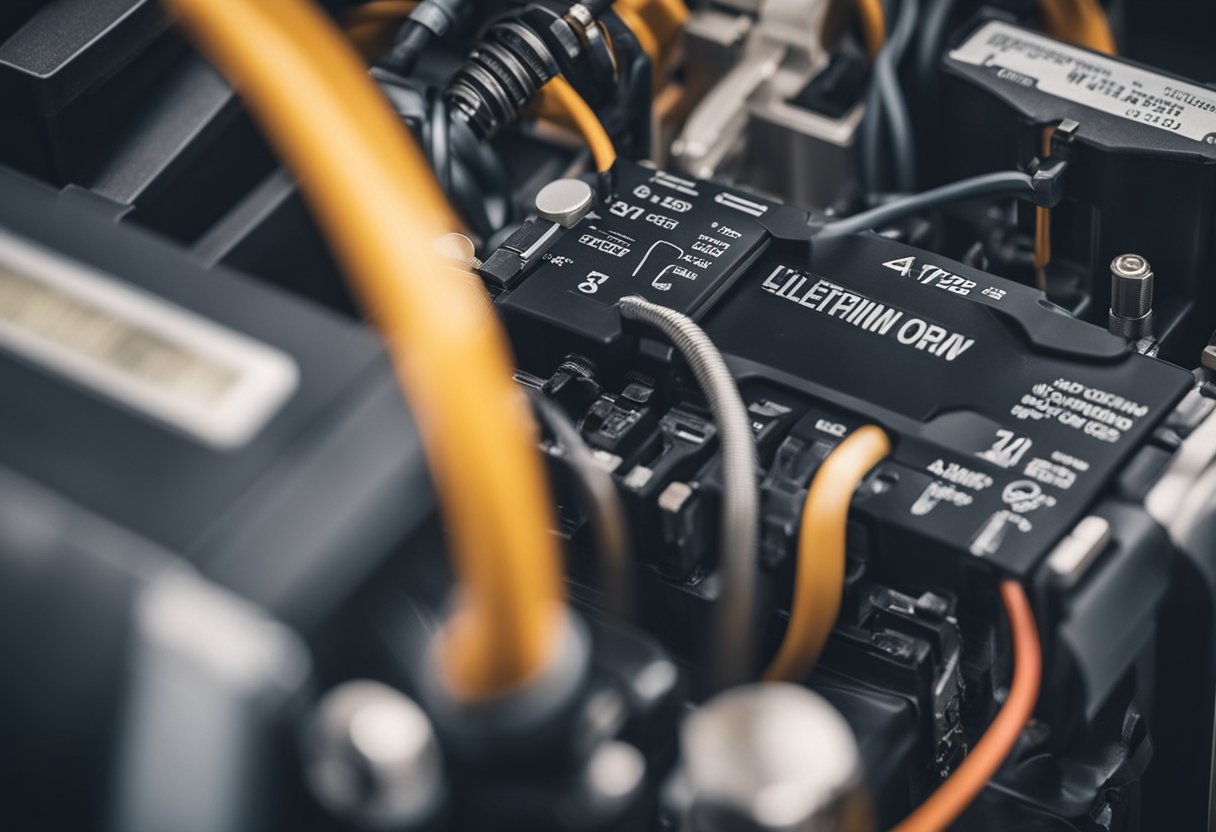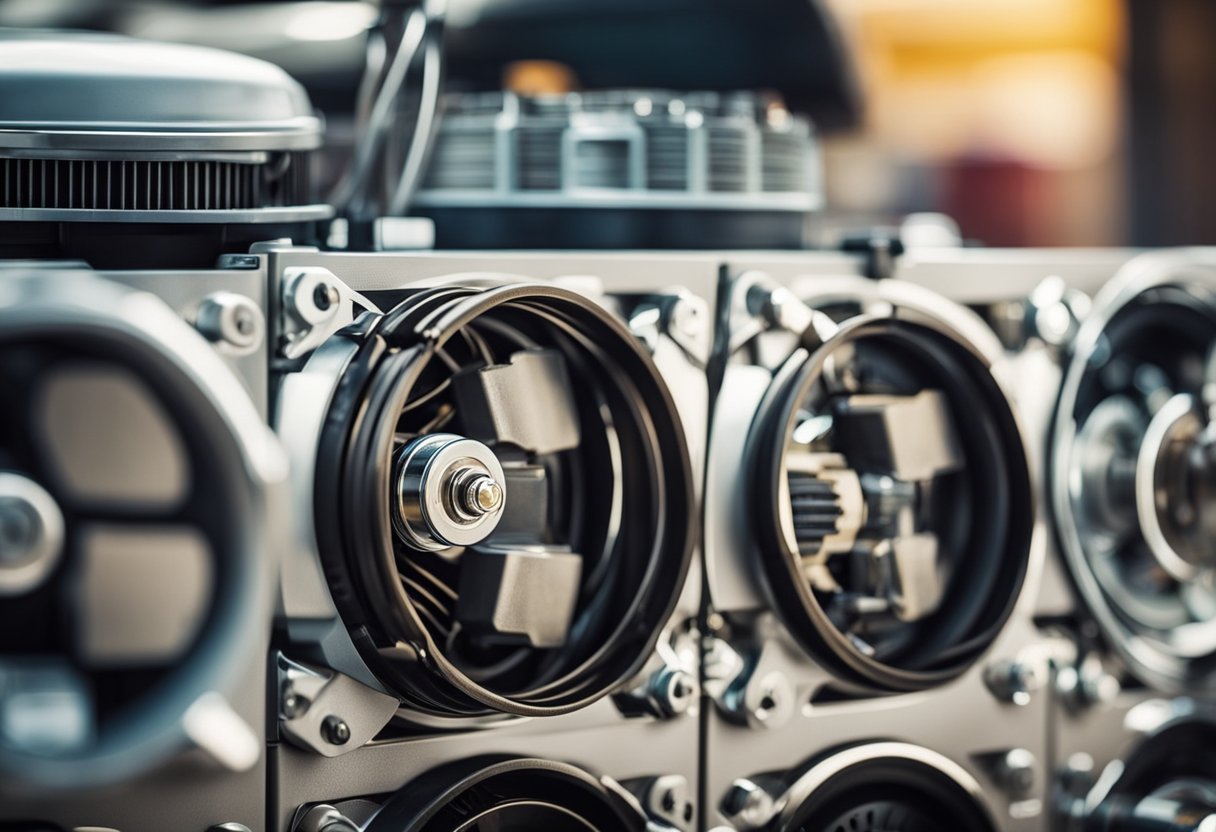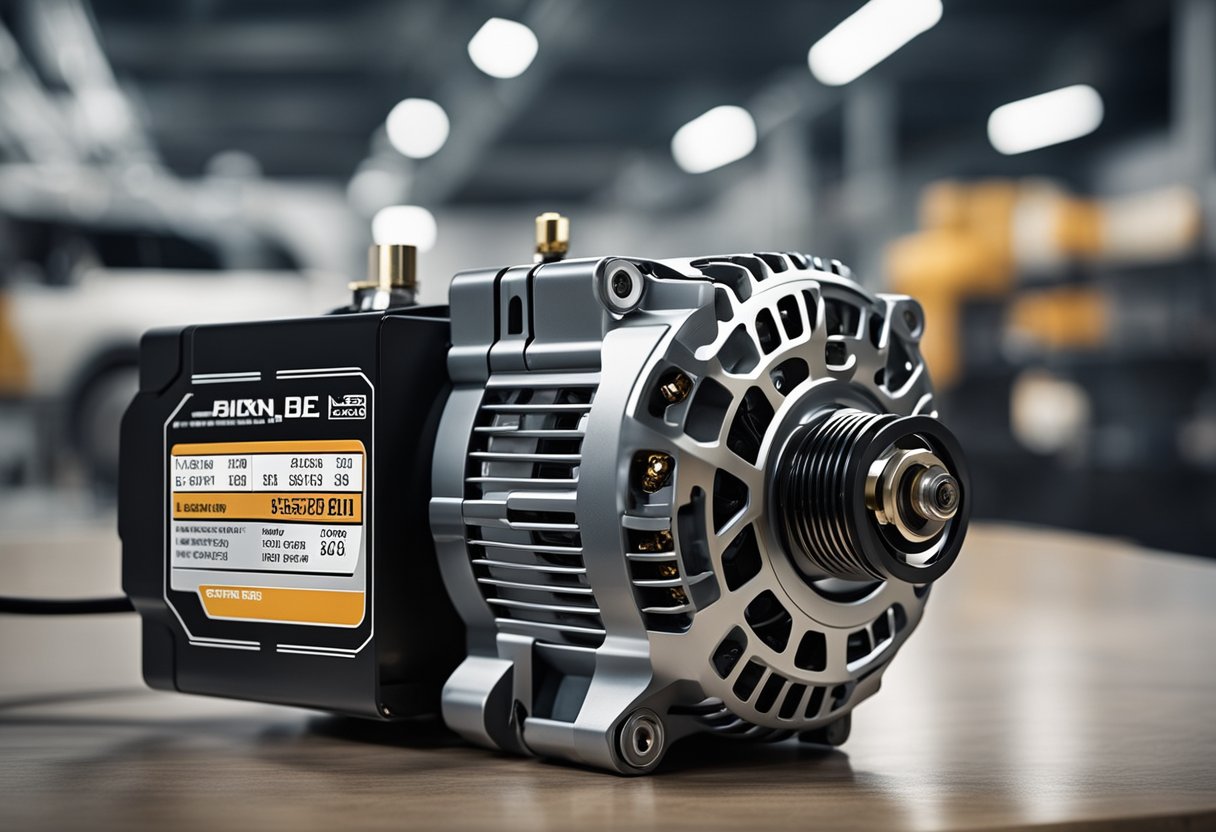I have been asked many times whether it is possible to charge lithium batteries with an alternator. The answer is yes, but it is important to understand the charging process of lithium batteries and how they differ from lead-acid batteries. In this article, I will explain how alternator charging systems can be used to charge lithium batteries and what you need to know to do it safely and efficiently.
Understanding Alternators and Lithium Batteries
Before we dive into the details of charging lithium batteries with an alternator, let’s first understand what an alternator is and how it works. An alternator is a device that generates electrical power from mechanical energy. In vehicles, it is driven by the engine and is responsible for charging the battery and powering the electrical system when the engine is running.
Charging Process of Lithium Batteries
The charging process of lithium batteries is different from that of lead-acid batteries. Lithium batteries have a higher energy density and can be charged at a faster rate. However, they require a different charging profile and voltage range. Lithium batteries need to be charged with a constant current until they reach a specific voltage, then the charging current needs to be reduced until the battery is fully charged. This process is called constant current-constant voltage (CC-CV) charging.
Key Takeaways
- Alternator charging systems can be used to charge lithium batteries.
- Lithium batteries have a different charging process and voltage range than lead-acid batteries.
- It is important to use a battery management system and regulate the alternator output when charging lithium batteries.
Understanding Alternators and Lithium Batteries
https://www.youtube.com/watch?v=4fwhnSGPYOo&embed=true
As an expert on the subject, I can tell you that understanding how alternators and lithium batteries work together is essential to ensure a safe and efficient charging process.
An alternator is a device that generates electricity by using the engine’s mechanical energy to rotate a pulley. The alternator produces electrical energy in the form of alternating current (AC) that is then converted into direct current (DC) by a rectifier. The regulated alternator is equipped with an external regulator that controls the output voltage of the alternator.
On the other hand, a lithium battery is a type of rechargeable battery that uses lithium ions to store and release energy. Lithium-ion batteries are known for their high energy density, low self-discharge rate, and long cycle life.
When charging a lithium battery with an alternator, it is essential to use a battery management system (BMS) to ensure that the battery is not overcharged or undercharged. Victron Energy offers a range of solutions, such as the Buck-Boost DC-DC Converter and the Orion-Tr Smart DC-DC Charger Isolated, which are suitable for alternator charging of lithium batteries.
It is important to note that the alternator’s RPM affects the charging rate of the battery. The higher the RPM, the higher the charging rate. Therefore, it is essential to ensure that the alternator is correctly sized for the battery bank’s capacity and that the pulley is appropriately sized to achieve the desired RPM.
In conclusion, understanding how alternators and lithium batteries work together is crucial to ensure a safe and efficient charging process. The right technology, such as Victron Energy’s range of solutions, can help you achieve the best performance from your lithium battery when charging with an alternator.
Charging Process of Lithium Batteries
https://www.youtube.com/watch?v=N-yxvZ3Tezg&embed=true
Charging lithium batteries with an alternator requires a basic understanding of the charging process. Lithium batteries have a high energy density and are rechargeable, making them ideal for use in many applications. However, charging lithium batteries requires a specific charging profile to ensure optimal performance and lifespan.
The charging process of lithium batteries involves several factors such as current, temperature, state of charge, and depth of discharge. The charging process also depends on the voltage parameters of the battery, which vary depending on the specific type of lithium battery.
Bulk charging is the first stage of charging lithium batteries, where the battery is charged with a constant current until the battery voltage reaches a certain level. Once the battery voltage reaches this level, the charging switches to a constant voltage mode where the voltage is held constant while the current decreases. This stage is called the absorption stage, and it is essential to ensure that the battery is fully charged.
The final stage of charging lithium batteries is the float stage, which is also known as the maintenance stage. During this stage, the battery is held at a constant voltage to maintain its charge. It is important to note that lithium batteries should not be overcharged or undercharged as this can damage the battery and reduce its lifespan.
To charge lithium batteries with an alternator, a battery charger that is specifically designed for lithium batteries is required. The charging profile of the battery charger should match the charging profile of the lithium battery to ensure optimal performance and lifespan.
In conclusion, the charging process of lithium batteries is a complex process that requires a specific charging profile to ensure optimal performance and lifespan. Charging lithium batteries with an alternator requires a battery charger that is specifically designed for lithium batteries and matches the charging profile of the battery. It is important to follow the recommended charging process to avoid damaging the battery and reducing its lifespan.
Battery Management Systems
https://www.youtube.com/watch?v=GXYJ1xC10j4&embed=true
As I mentioned earlier, charging lithium-ion batteries with an alternator requires careful consideration. One of the most important components in this process is the Battery Management System (BMS). A BMS is an electronic system that monitors and controls the charging and discharging of lithium batteries. It is responsible for ensuring that the batteries are charged safely and efficiently, and that they are not damaged by overcharging or overheating.
One example of a BMS that is specifically designed for use with lithium-ion batteries is the Smart BMS 12/200 by Victron Energy [1]. This BMS is an all-in-one system that is designed to work with Victron’s lithium-iron-phosphate (LiFePO4) Smart Batteries. It has been specifically designed for 12V systems with a 12V alternator, making it a great option for vehicles and boats.
One of the key functions of a BMS is to prevent overheating of the batteries. Overheating can be caused by a number of factors, including overcharging, high ambient temperatures, and high discharge rates. To prevent overheating, the BMS will monitor the temperature of the batteries and adjust the charging rate as needed to keep the temperature within a safe range.
Another important function of a BMS is to prevent overcharging of the batteries. Overcharging can cause the batteries to become damaged or even explode, so it is important to prevent this from happening. The BMS will monitor the charging rate and adjust it as needed to prevent overcharging.
In summary, a good BMS is essential when charging lithium-ion batteries with an alternator. It will help to ensure that the batteries are charged safely and efficiently, and that they are not damaged by overcharging or overheating. The Smart BMS 12/200 by Victron Energy is one example of a BMS that is specifically designed for use with lithium-ion batteries and can help to ensure that your batteries are charged safely and efficiently [1].
[1] https://www.victronenergy.com/battery-management-systems/smart-bms-12-200
Alternator Charging Systems
https://www.youtube.com/watch?v=Kl_sLR1S6Mw&embed=true
As an owner of a lithium battery, you may be wondering if you can charge your battery with an alternator. The answer is yes, you can. But it is important to exercise caution and take the necessary precautions to ensure the safety of your electrical system.
When it comes to alternator charging systems, there are a few things to keep in mind. First, you need to make sure that your alternator is compatible with your lithium battery. Some alternators are not designed to charge lithium batteries, and using them could damage your battery or even cause a fire.
One way to ensure compatibility is to use a DC-to-DC charger or converter. These devices are specifically designed to charge lithium batteries from an alternator and can help regulate the charging process to prevent overcharging or undercharging.
Another thing to consider is the voltage output of your alternator. Most alternators output a voltage of around 14 volts, which is too high for lithium batteries. To prevent damage, you need to use a voltage regulator or a DC-to-DC charger that can regulate the voltage to the appropriate level for your battery.
Overall, alternator charging systems can be a convenient and efficient way to charge your lithium battery. But it is important to do your research and take the necessary precautions to ensure the safety and longevity of your battery and electrical system.
Regulating Alternator Output
https://www.youtube.com/watch?v=e5kfy3i_Njg&embed=true
When charging lithium batteries with an alternator, it is crucial to regulate the output of the alternator to ensure that the battery is not overcharged or undercharged. An alternator’s output varies with engine RPM, so it is important to understand the relationship between RPM and alternator output.
One way to regulate the alternator output is to use an external regulator. An external regulator is a device that controls the output voltage of the alternator. It is responsible for ensuring that the output of the alternator is always within a safe range, regardless of the load on the alternator.
Another way to regulate the alternator output is to use a regulated alternator. A regulated alternator has a built-in regulator that controls the output voltage of the alternator. This type of alternator is designed specifically for charging lithium batteries and is an excellent choice for those who want to simplify their charging system.
The pulley on the alternator can also affect the output of the alternator. A smaller pulley will spin the alternator faster, resulting in a higher output voltage. Conversely, a larger pulley will spin the alternator slower, resulting in a lower output voltage. It is important to choose the right pulley for your alternator to ensure that it is charging your lithium battery correctly.
Finally, the rectifier in the alternator is responsible for converting the AC output of the alternator to DC. A faulty rectifier can cause the alternator to overcharge or undercharge the battery. It is important to check the rectifier regularly to ensure that it is functioning correctly.
In conclusion, regulating the output of the alternator is essential when charging lithium batteries. Using an external regulator or a regulated alternator, choosing the right pulley, and checking the rectifier regularly can help ensure that your lithium battery is charged correctly and safely.
Solar Charging and Lithium Batteries
When it comes to charging lithium batteries, solar charging is a popular option among many RVers and boaters. Solar panels are a great way to harness the power of the sun and use it to charge your lithium batteries. However, it is important to note that not all solar panels are created equal.
To maximize the efficiency of your solar charging system, it is recommended to use a solar charge controller. There are two basic types of solar charge controllers to choose from: MPPT and PWM. For lithium batteries, it is recommended to use an MPPT charge controller, such as the Renogy Rover. This will provide the best possible results and ensure that your batteries are charged efficiently.
Another important thing to consider when using solar panels to charge lithium batteries is the voltage. Lithium batteries require a specific voltage range to charge properly, and if the voltage is too high or too low, it can damage the battery. Make sure that your solar panels are producing the correct voltage for your lithium batteries.
Overall, solar charging is a great way to keep your lithium batteries charged and ready to go. With the right solar panels, solar charge controller, and proper voltage, you can ensure that your batteries are charged efficiently and safely.
Conclusion
In conclusion, charging lithium batteries with an alternator is possible but requires careful consideration of several factors. The charging profile of lithium-ion batteries is different from traditional lead-acid batteries, and special attention must be paid to voltage parameters and bulk charging.
To avoid overheating and damage to the alternator, a battery management system (BMS) such as the Victron BMS 12/200 can be used to regulate the charging process. Additionally, a regulated alternator or an external regulator can be installed to ensure that the charging voltage remains within safe limits.
It is important to note that the depth of discharge and state of charge of the lithium battery can affect its lifespan. Therefore, it is recommended to monitor the battery’s state of charge and avoid discharging it below a certain level, typically 20-30%.
Finally, it is worth considering the use of a DC-DC charger or a DC-to-DC converter to ensure that the electrical system of the vehicle is compatible with the high energy density of lithium batteries. Solar panels and a solar charge controller can also be used to supplement the charging process.
Overall, charging lithium batteries with an alternator is a viable option for those looking for a rechargeable battery technology with high energy density. However, it is important to understand the technology and follow proper charging procedures to ensure the longevity and safety of the battery and the electrical system.
Frequently Asked Questions
What is the maximum charging current for a lithium-ion battery?
The maximum charging current for a lithium-ion battery depends on the battery’s capacity. As a general rule, the charging current should not exceed 1C. For example, if you have a 100Ah lithium-ion battery, the maximum charging current should be 100A. Charging the battery at a higher current can cause overheating and damage the battery.
How long does it take to fully charge a 100Ah lithium battery?
The charging time for a 100Ah lithium battery depends on the charging current and the battery’s state of charge. As a general rule, it takes about 1 hour to charge a 100Ah lithium battery with a charging current of 100A. However, the charging time can vary depending on the battery’s chemistry and temperature.
Can a boat alternator safely charge a lithium battery?
Yes, a boat alternator can safely charge a lithium battery if you use the correct charging solution. You will need a lithium battery charger that can handle the alternator’s output and provide the correct charging profile for your lithium battery. Some examples of lithium battery chargers that can be used with a boat alternator include Buck-Boost DC-DC Converters, Orion-Tr Smart DC-DC Chargers Isolated, and Battery Management Systems (BMS).
How do you charge a lithium battery while driving?
To charge a lithium battery while driving, you can use a DC-DC converter or a battery isolator. A DC-DC converter is a device that converts the voltage from your vehicle’s electrical system to the voltage required by your lithium battery. A battery isolator is a device that separates your vehicle’s electrical system from your lithium battery, allowing you to charge the battery without discharging the vehicle’s battery.
Can a lithium battery be charged with a generator?
Yes, a lithium battery can be charged with a generator if you use the correct charging solution. You will need a lithium battery charger that can handle the generator’s output and provide the correct charging profile for your lithium battery. Some examples of lithium battery chargers that can be used with a generator include Buck-Boost DC-DC Converters, Orion-Tr Smart DC-DC Chargers Isolated, and Battery Management Systems (BMS).
Will using a lead-acid charger damage a lithium-ion battery?
Using a lead-acid charger to charge a lithium-ion battery can damage the battery and reduce its lifespan. Lead-acid chargers use a different charging profile than lithium-ion batteries require. Lithium-ion batteries require a constant current and constant voltage charging profile, while lead-acid batteries require a multi-stage charging profile. Using a lead-acid charger can cause the lithium-ion battery to overcharge or overheat, which can damage the battery.

Hi, I’m Sal Muller of Tooltrip.com. My DIY experience led me to understand essential power tools for home projects. Tooltrip.com guides enthusiasts and professionals in choosing right tools for any job. I provide concise top tool reviews for easier, efficient DIY.





